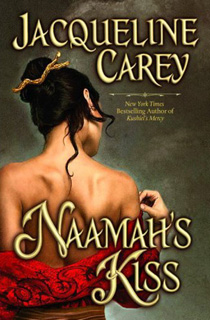Gods and Monsters
 Jacqueline Carey’s third Terre d’Ange trilogy, the Moirin books, seem to be in general better liked than the books about Imriel. I can’t agree with this opinion. It might be because I read them first, and therefore had gone pretty far into Naamah’s Kiss before I got a satisfactory translation of “diadh-anam“. From context, I was forced to conclude that “”diadh-anam” was Cruithne for “plot”. As in “Jehanne, I adore you, but I find that the plot is telling me I must go to China.”
Jacqueline Carey’s third Terre d’Ange trilogy, the Moirin books, seem to be in general better liked than the books about Imriel. I can’t agree with this opinion. It might be because I read them first, and therefore had gone pretty far into Naamah’s Kiss before I got a satisfactory translation of “diadh-anam“. From context, I was forced to conclude that “”diadh-anam” was Cruithne for “plot”. As in “Jehanne, I adore you, but I find that the plot is telling me I must go to China.”
Of course all the main characters in the Terre d’Ange books have been a singularly god-ridden bunch. However, Phèdre and Imriel and their cohorts had to deal more with powers and inclinations that they received from their gods in much the same way that other heroes have received them from radioactive spiders. The actions they take are to help friends, or make bargains with enemies, or act for their country, or earn a living, or do stupid things because of lust or youth or stupidity.
Moirin, on the other hand, has a goddess that micromanages her every action. Go to Terre d’Ange. Date a hot magician. Learn tai chi. Etc., etc. The Maghuin Dhonn winds up being a character as present in the book as poor, sexy, silly Moirin herself, only a lot less interesting. It’s the Q problem. How do you use a god among mortals as a character? Alan Moore did it with Dr. Manhattan, but that worked because he let us into Dr. Manhattan’s brain, showed us what the world looked like to him. But all you ever see of the Maghuin Dhonn is just her moving her favorite character around like a chess piece; and why would you ever want to read a book about the adventures of a chess piece, when you could read about the mind behind the chess game?
 The City and the City
The City and the City